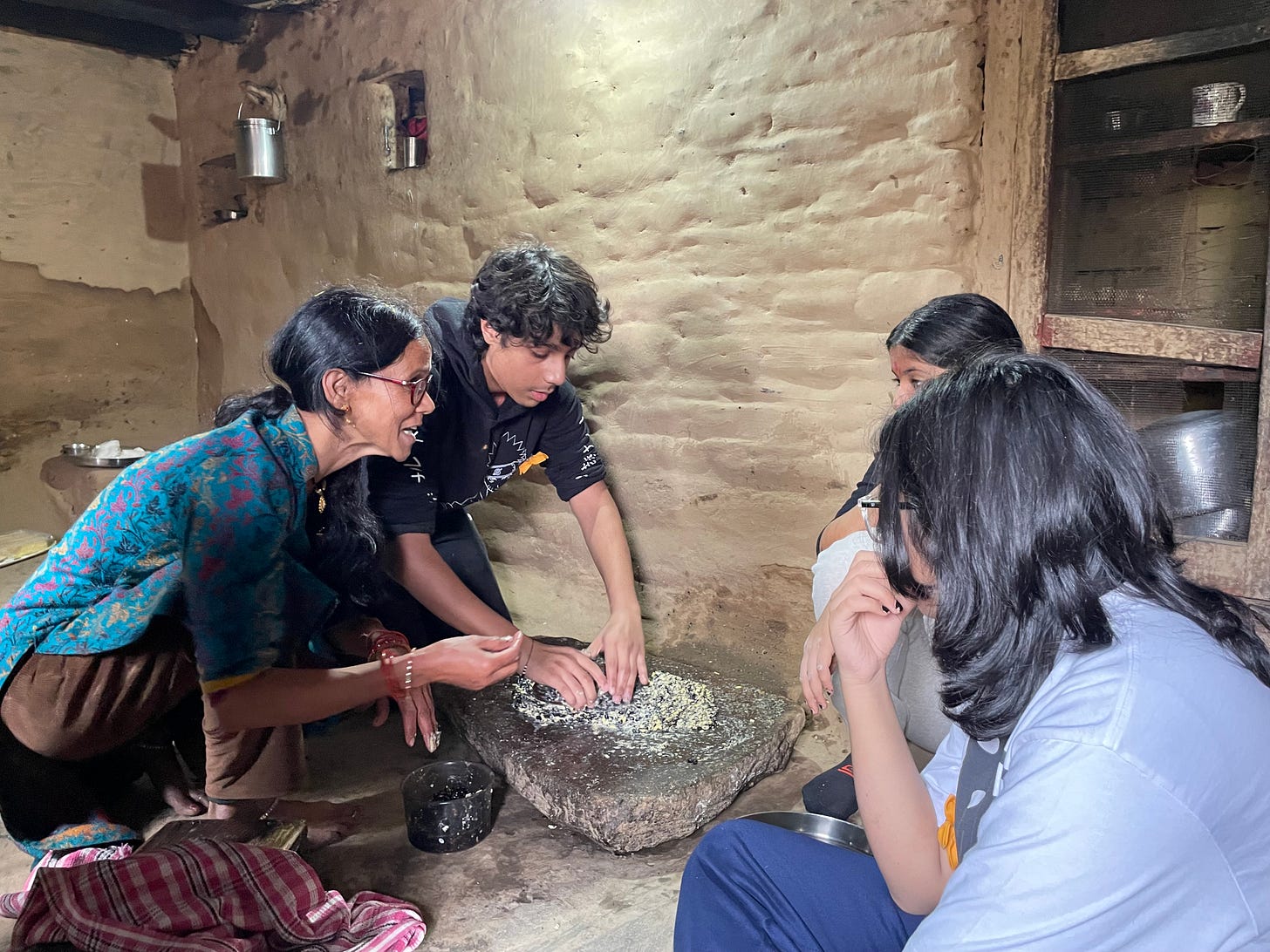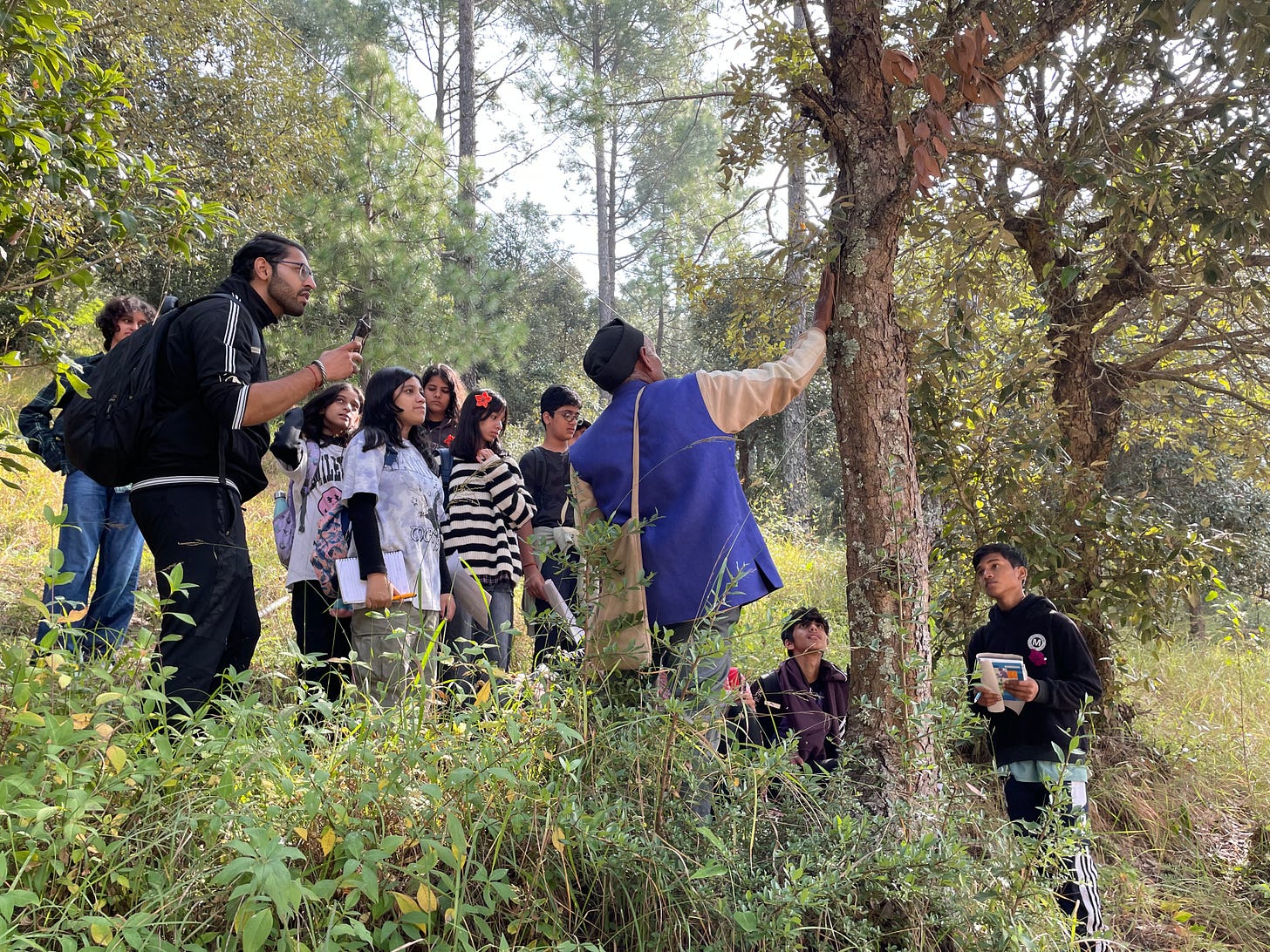Going Rural at Majkhali: A Transformative Experience
By Kavita Tiwari (Math facilitator and homeroom in charge of Grade 8), learners' perspective will follow in part 2
OLEs in Prakriti have always been such a great learning experience for me, so was this one. I am sharing my observations and learnings from this trip.
A Glimpse into Rural Life
The Majkhali experience was unique in so many ways. All of us got to experience the lives of the villagers there. We not only observed but were involved in their daily activities such as fetching water from a source, plucking vegetables, making their traditional dal, bhat ke dubke with them.
I assumed that the boys in each group would be less involved in kneading the dough and rolling chapatis but it turned out that they were not only interested but also did a good job rolling a round or evenly flat one.
I wondered how children would respond if they had to spend a week or more doing the same chores... But I am glad that actually got to experience rural life even though it may have only brought excitement in them. Hindi is not our learners' natural (or first) language. All of them made an effort to translate their thoughts and questions into Hindi to connect with the people there. Immersing in a language is the best way to learn a language as we could hear children having conversations with each other in Hindi as well.
Lessons from the Experts:
It was our pleasure to build an understanding about the various aspects, the environment, culture, politics etc. of the place from Ajay Rastogi Ji, the founder of Vrikshalaya. He is a very sensitive and observant person.
We learnt how pine trees could be both friend and foe for the environment, how water reaches each house in the village, the implications of forest fire apart from increase in temperature, the beliefs of people about the locally worshipped deities and much more.
I learnt how it is important to have some simplicity in us to accept and engage in the culture of a place and then learn and reflect over our experience and observations to make sense of the place.
Solitude & Serenity in Nature:
How could we not spend solitude in nature, being in the nature's lap? The early morning hike to the sunrise point was beautiful. We spent some quiet time while waiting for the sun to rise. Spending time with ourselves to look within is as important as observing the world outside. No one knows how each child experiences being in nature. It could be meditative and healing for many.
I learnt that as facilitators, it is our responsibility to allow quiet time once in a while and children experience it the way they want to.
After reaching the destination of our second trek, a locally worshipped deity , Chamu Devta's temple, children saw some blood on the courtyard of the temple. It raised many questions about animal sacrifice. They seemed upset as well as surprised. We let children react to it. Then Ajay Ji sat with children in a circle to tell them that Chamu Devta is considered the God and protector of animals and people offer their goats, their cow's milk to the god. It was a sensitive topic and Ajay Ji responded to it very sensitively.
Inter-Grade Learning and Collaboration
OLEs are also opportunities to learn about and work with learners of other grades. Learners of grades 8 and 9 worked in groups of 5-6 to explore the themes assigned to them. These were: Culture and Community, Geography and Architecture, Village Economy and Sustenance, Education and Employment, Local Governance and Justice and Healthcare and Sanitation. On the last evening at Majkhali, they presented their learning and questions with the entire group. The learners were expected to build upon their learnings and feedback from their presentations for their second presentation in school assembly.
I thank Mohit Bhaiya for being so inquisitive about learning everything and talking to children with much sensitivity. Meenal Didi and Deep Bhaiya, parents of a grade 8 child for volunteering to come along and being so caring towards the children and us. I appreciate Meenal Didi's observant nature. She noted the interests and assumptions of the learners and gave feedback to attend to them. Deep bhaiya, for sharing his knowledge about the agricultural and the socio-cultural aspect at the right time. Namrata Didi, from the host team to arrange all the logistics so swiftly and take care of the children as her own. Ajay Ji, for being very flexible with some impromptu changes and all his knowledge, skills and honest feedback. And definitely, the people of Majkhali, who were so open and accepting of us.
Notes by Mohit Bhaiya…
The trip to Majhkhali was an unforgettable opportunity for experiential learning, allowing us to connect deeply with our learners and immerse ourselves in the beauty of nature. Before the trip, I was filled with a mix of excitement and anxiety, as this was my first experience as a facilitator, and I had doubts about how well I’d be able to navigate unfamiliar situations. However, the entire journey—from the train ride to the serene resort, and finally, the rural immersion—unfolded smoothly, offering countless learning experiences. I owe immense gratitude to the wisdom of Ajay Ji and Kavita Didi, and the humor and insights from Deep Bhaiya, which truly enriched the journey.
The trip was a treasure trove of discoveries, not only around our main topics, Architecture and Geography, but also the natural wonders of the region. We encountered a variety of trees, like oak and pine, and came across plants like Bichhu Booti, which stung many of us! We examined the leaves of castor, cannabis, pine, and oak, and even saw a fascinating leaf that changes color in sunlight—shoutout to Vihaan for showing me this, and I’m eagerly awaiting his presentation on it. Beyond botany, we delved into the local culture and history; one evening, we watched the village’s Ramleela, which was a moving experience, and, as Kavita di shared, we discussed the cultural beliefs surrounding the temple of Chamu Devta.
It was also eye-opening to see Shivanshi and Prithvi collecting the resinous, inflammable sap from pine trees. These moments allowed me to learn so much, not only about the environment but also about our learners—their curiosity, courage, and resourcefulness were inspiring.
I am especially grateful to Meenal didi, whose emotional intelligence I greatly admire. Her support helped me gain a deeper understanding of a few learners and their unique thought processes, which will be invaluable as I continue my journey as their facilitator.
Finally, my heartfelt thanks to the entire Prakriti team, especially Rahul bhaiya, who encouraged me to embrace this opportunity. Despite my initial reluctance, this experience turned out to be transformative, leaving me with lasting memories and invaluable insights.
-Mohit Kwatra (Facilitator: Physics, Mathematics, STEM & System Design)









Dear Kavita Ma'am,
I absolutely loved reading your recent article! Just a small note—during your second trek, where you've described our cherished deity, "Chamu Devta," there's a minor typo: our beloved "Chamu Devta" seems to have been spelled as "Chomu." I thought I'd bring it to your attention to preserve the spirit of the piece perfectly.
Thank you!